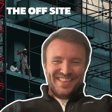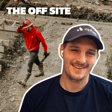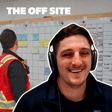Become a Creator today!Start creating today - Share your story with the world!
Start for free
00:00:00
00:00:01

How New Plant Technology is Impacting UK Construction Projects
In this episode, Jason & Carlos are joined by construction journalist Peter Haddock talk about innovations coming out of plant manufacture & hire.
The three discuss the current state of play with UK plant in general, how to best solve the issue of mixed fleets on projects as well as the future of autonomous vehicles in construction.
Follow Carlos on Linkedin | Follow Jason on Linkedin | Check out Aphex
Transcript
Introduction and Context Setting
00:00:00
Speaker
I did have a mental note when I was thinking about the introduction of the Clarkson reference of double checking whether or not he'd been cancelled for anything first. And as I was going through the intro, I was like, damn it, I forgot to check. So good, good to know that no one freaked out that he had done something that got he shouldn't have been the reference.
00:00:20
Speaker
You're listening to the Offsite podcast with Jason and Carlos, where we talk all things construction and technology. Join us for discussions with industry leaders and insights into the latest trends in construction.
00:00:34
Speaker
Welcome back to the pod. So I get a grief a lot, Carlos, for saying at the start of every episode how excited I am to talk to the guest that is joining us. But today I am excited to speak to our guest. And I think I'm probably, Mona said to you that I'm a little starstruck.
00:00:52
Speaker
So I came across, I guess, videos on LinkedIn like a year, maybe a year or two, maybe a year and a half ago. And like now for me, it's core content on LinkedIn. I like to think of him as the Jeremy Clarkson of construction equipment.
Meet Peter Haddock: The Jeremy Clarkson of Construction
00:01:07
Speaker
So Peter Haddock is a UK based equipment journalist. He reviews and makes content about a construction plant and equipment. And I'm a follower on LinkedIn. So Peter, thanks for joining us, mate.
00:01:21
Speaker
Thank you very much. Loving the Clarkson reference. Only if I was as popular as him, but, you know, certainly trying to make things a little more entertaining. And apparently I do edutainment, Jason. So, you know, make people excited about the industry, which is fantastic to be in and hopefully educate people at the same time with the sort of longer interview style videos, really, than people are used to.
00:01:47
Speaker
I think so. Yeah, you're I'd say the the stand out being for those that haven't seen your videos is like your enthusiasm is infectious in the in the video. So definitely keep keep it up. I fun fact I did. I did have a mental note when I was thinking about the introduction of the Clarkson reference of double checking whether or not he'd been canceled for anything first. And as I was going through the intro, I was like, damn it, I forgot to check. So good, good to know that no one freaked out that he had done something that got he shouldn't have been the reference.
00:02:17
Speaker
I guess maybe for a softball question to kick things off and start the conversation, Peter, I am interested instead of playing equipment is around your videos scripted or unscripted?
The Future of Construction Equipment: Technology and Innovation
00:02:30
Speaker
I'm completely unscripted. So I'll go on to sign. I've never met.
00:02:34
Speaker
generally any of the people I'm talking to so I'll have a quick chat with them and about what they're doing and the tech they're using and stuff like that but I've got an engineering background as so an engineering degree and I've spent about now 20 years in the sector previously doing sort of PR strategic comms so I've been immersed in this industry for a long long time and fortunately
00:03:00
Speaker
and listened a lot and gathered the knowledge of where things are going. So that allows me to ask the technical questions, but also the simple ones, which is like, you know, how does it work? You know, I mean, people get carried away with all of their acronyms. It's a four or five, seven, five version, two, three, four. Well, no, it's a camera system.
00:03:20
Speaker
you know, and it's like, find out how it works, you know. And I think that for me, having that technical brain just makes me want to deep dive into things, but try and explain them to people in human terms, you know, rather than it's cool tech, and you should buy it. I don't think people have gone past that they want to know why, you know, why is it different? And
00:03:42
Speaker
the one thing i don't do is is say buy this you know i i just enable people to talk about their products and explain them and then ask the questions that i think the outside world you know and your listeners want to know the answers to it.
00:03:57
Speaker
Well, I think the other good news for listeners, anyone listening to this is that for the first time in this podcast, they're going to hear what an actual good interviewer sounds like. So that's another bonus with you joining us today, mate. So maybe to start talking about something more serious, so plant and technology. I think a lot of the people listening to this will be in construction, on infrastructure, maybe some building projects.
00:04:27
Speaker
they're managing projects they might be uh scoping or delivering work with a lot of plant equipment but maybe not super in the detail of the technology on that equipment in the delivery of that work and how that is has changed and is changing and i guess will change for the stuff that you're seeing going going forward so
00:04:48
Speaker
I guess I'd be super interested to maybe just with the idea of maybe starting with Earth moving. Is there any way you can summarize where you think we are in the state of plant and technology with regards to, say, Earth moving equipment?
00:05:03
Speaker
I think with earth moving equipment we've seen lots and lots of changes now. In the European market we've had legislation to get us up to stage five emissions so we've done a lot of work on engines and stuff like that. Now we're going into electrification and so that is coming through. There's lots and lots of different things that are happening.
00:05:23
Speaker
Quite a running in different context with the electrification. We're seeing a lot of things in generators, hybridizing lots of inputs. So generators with solar coming in, with charging up overnight and things like that. And I think we're really seeing this explosion
00:05:41
Speaker
in the way that we can use alternative fuels or what we call drop-in fuels. So that's really changing the equipment itself, but the tech is now really, really exciting because the technology of how you operate the machines is really important. So new machines, we always sort of have people saying, oh, there's power mode, there's eco mode, there's all these different modes. Some of the manufacturers are going, well, hold on. Like, so I'd spoke to Caterpillar recently with a small wheel loader,
00:06:11
Speaker
they've done it all for the operator so they've taken all these things and said we're gonna make it auto so if the people want power it's right there the engine and the product can give it but while they're not using that power mode for the five percent of the product of the time,
00:06:28
Speaker
we'll give them the eco mode which will save them energy and save them obviously fuel and i talk about energy a lot because sometimes it's electric sometimes you know it's diesel and so all of those on board you know from the factory solutions those auto solutions those helping solutions that they're coming through because we have a real problem.
00:06:48
Speaker
with operators in the uk you know we've got a huge gap where people sort of stop to their apprenticeships and therefore you know we've got 10 years a decade or more of people that haven't been trained and so young people coming through the playstation generation as they call it they they basically i wish i was in the playstation
00:07:11
Speaker
they're training in a different way and you know that's really important and so they're more tech orientated and so for me you're seeing this huge emergence of how you can find the information that your managers want
00:07:27
Speaker
by bringing data off all of the machines on their idle time, their fuel burn, their health, because they can wave at you and say, I'm not feeling very well. You need to look after me a bit better, get me a service. And all of that data comes in, and there's OEM agnostic brands that I've worked with, like MachineMax, which will collect that in from a JCB, a cat, a John Deere, or whatever, and put a dashboard together for that site manager to say, here's how the equipment's performing.
00:07:56
Speaker
you know, and if you've got a lot of people keeping the machine running idling to keep warm in winter, that's using a huge amount of fuel. And that can just simple training techniques that we've got in the UK, like eco operator training that the big players are like Flannery plant hire and Lynch plant hire, there are big plant hire companies here, they're rolling that out to be better on site for the whole project.
Efficiency in Construction: The Role of 3D Control and Data Integration
00:08:22
Speaker
Peter, I'm super interested in the technology and the software and the sensors on equipment. And I guess, probably starting with a very basic and dumb question, but who's typically responsible for that technology? Is it like the vendor that makes the machine? Is it the owner that then has it across their fleet they might hire out? Is it the hirer that ends up, who really ends up putting
00:08:50
Speaker
different technology on the machine. Right. So you've got your standard onboard technology, which is running your equipment. Yeah. And so that is becoming more and more sophisticated. But I do a lot of work with Leica Geosystems as part of this sort of hexagon group.
00:09:05
Speaker
And they create 3D models, basically, are created to use their 3D machine control. So this is retrofitted, has been in the past. But you're getting people, manufacturers like Itachi and Liebert, coming out of the factory. And there's more manufacturers that are going to be factory-fitting. Cat has also done that now, their technology. And those are sensors on the bucket, the boom, the stick.
00:09:33
Speaker
and then all feed data into the brains of the machine. And then you've got a tablet inside there, where the tablet sits, that has all the calibration data of the machine. So this tablet itself, you can take it out, put it in another machine, because as soon as you plug it into the machine, it reads all the calibration data and says, I'm a 20-ton excavator, here's what my setup looks like.
00:10:02
Speaker
So I just saw literally last week on-site people retrofitting a Volvo excavator with this system and basically that was through a dealer for Leica Geosystems called Engrade and there's lots of dealers around that can retrofit but then you're getting things coming out of the factory that are Leica ready so you can use that or you can just use it
00:10:29
Speaker
as an excavator. And then when you're ready for that 3d machine control, you can plug it in. Now for your audience, really 3d machine control, in my mind is an absolute must, because cost of material have gone up. So if you're digging a really big trench, there's not got to be a meter, a meter deep, let's make sure it's exactly a meter deep. And so you can create a model. And you can actually ensure that the excavator operator can't dig
00:10:56
Speaker
at 1.2 meters and then you've got all that expensive aggregate or concrete or whatever to go into the trench and so therefore you're saving money and you're saving time because what you do is you send the model to the machine fleet that's on site and they can have the complete site model from day one
00:11:18
Speaker
so if i'm really really fast and very efficient as an operator i'm not waiting around for the next part of my job i'll just move to another part of the site click where i am and the model then allows me to carry on working and i think that's
00:11:33
Speaker
critical when you're talking about efficiency and getting things done. We had a project called the A14, major infrastructure road project that was delivered early and under budget that used that technology. And it's mandated now by National Highways who looks after our big roads and stuff. But you now got things that I'm following a road called the A417 with National Highways and a big tier one contractor here.
00:12:01
Speaker
They've created a 3D model of the whole site and the whole delivery of what needs to go where and they've done digital rehearsals on how to deliver that with plant and equipment. So how to fleet match it, what technology you want and therefore
00:12:20
Speaker
before anything goes on site, everybody knows what they're doing, the design and everything. And so they've even gone to the extremes because where the rock in that particular part of the country is quite brittle. And so they've got ground penetrating radar on the back of a
00:12:41
Speaker
ATV all terrain vehicle as such that is monitoring where any voids are, you know, and they found voids and filled them up before the excavators go on site. So again, it's brilliant. They've got all of this above ground underground and things like that.
00:12:58
Speaker
Yeah, that's cool. I think like, um, if, if I think about, uh, on most construction projects, uh, there's, you know, equipment's coming onto site all the time. We're either dry hiring or wet hiring it, or it's coming through a subcontractor or whatever. Yeah. And so I guess, yeah, the question I was thinking about when I was thinking about who's responsible for putting the technology on the machine that I get through a wet or a dry hire, someone's getting a mixed fleet. It's, you know, it's something to point out there. Yeah. Whether it's the hire or the project or everyone. Yeah. And so.
00:13:28
Speaker
Is the solution that the manufacturers or the technology makers are having kind of open standards for data transfer, or is it that people are retrofitting another system on top of the thing?
00:13:42
Speaker
No, no, what's happened is the industry sort of come together with that kind of information. So typically in the UK, the plant hire company, because we're plant hire led in the UK, not contractor led elsewhere in the world, the plant hirers will enable their machines to take the technology.
00:14:01
Speaker
And so therefore it's a plug and play situation and if they don't enable their machines, they won't get on some of these projects, these higher end projects anyway. So the plant hire does that but they tend to do it through a dealer or they'll now be buying in the equipment that's ready. So some of them will have their own internal teams where they look after that.
00:14:20
Speaker
Some of them will, will work with with like a like a justice and dealers that will help them. And so those dealers might also provide them like the site I just went to they provide them with the rovers that the surveyors go on site and do all of that work to help the model.
00:14:37
Speaker
Then they provide them with the machine control, the backup and support. And what's really cool is if somebody's not too sure about a model or something, those engineers can dial in to that exact machine and set stuff up for them and solve their problems. But the really cool thing that I saw last week was a Rover kit that was put onto a truck, right? So none of it was a big Ford or something like that.
00:15:07
Speaker
where the operator where the site manager can drive around and inside he's got a tablet which shows exactly what the excavator operator would see in the exact position he's at so basically he was driving around and showing me the levels so he said we've got cut here we've got fill here this is what we need to do i can see what's what's uh what from not even getting out of of his vat of his truck which is just brilliant because it was raining
00:15:37
Speaker
And it was horrible. And it was a reclamation site full of just, you know, it's just, you know, really, really horrible site to treasure round in. I had to do that to take some pictures. But that gives everything he needs. And they even put on this technology where they were monitoring the payload of the excavator putting into the ADT, because they've got contaminated land.
00:16:02
Speaker
So they need to show where the contaminants are moving. So how much they've got, and that moved to a set area, which is sort of sound off, and they're giving that data to the local council to say, here's how much we've got, here's exactly where it is, and here's how much it's gonna cost to treat and get rid of. And so all of that's in one system, the one Leica system, all linked together through their sort of Connex technology.
00:16:30
Speaker
Yeah, so that's sorry to Carlos to jump in over the top. That was the bit I'm really interested in, like on the flip side. So yeah, I get the machine control bit, but the other side around sensors, load monitoring and where it's gone and all that sort of stuff.
00:16:45
Speaker
The, because we see a lot, like I'm, I'm obviously in Australia at the moment and a lot of the projects here, we see some form of that starting to really happen on most big earthworks projects. But it all seems to be through like an additional system set, like on top of the.
00:17:01
Speaker
You know, it's not, it's a, it's another third party system put on top. Usually I think it mixes between the contractor and the, and the hirer. Yeah. So yeah. So you also, I guess the question I was interested to know is, is that kind of the state of play or is it starting to become more something that the hirers do? Yeah. It comes to the level of where you're at. So, you know, I know a lot about Caterpillar machines. I've worked with them for 20 years as a brand and they've got payload monitoring on
00:17:31
Speaker
on board, you know, so they've got that technology on board. And so what you're doing is you're taking the techy terms, you're taking the API feed, which is just a data feed from that piece of equipment into your management software, like I mentioned, the sort of machine Mac system will put that into a dashboard for you. So you've got some of those sensors for that kind of payload monitoring that are already now available from the manufacturers of new equipment.
00:17:59
Speaker
With the machine control, you've got the plug and play coming through now, but you've also retrofitted it. The critical thing, Jason, is the mixed fleet, right? And when you come to mixed fleets, lots of things like Liebes on Volvo, JCB, but all on one project,
00:18:19
Speaker
What you need is a standardized way of doing things, and that's where you'll see these sensors being put on to individual machines to match all the information, to make sure you're standardizing what you're getting.
00:18:34
Speaker
And so as things move forward, you know, and all the manufacturers have say payload monitoring, then you're basically going to pull that data in. But if you've got some that have, and some that haven't, you're going to continue to sort of retrofit and add these sensors in at the moment.
00:18:52
Speaker
So you sort of end up with, so I guess to summarize, you're seeing that that hardware layer goes more and more towards the manufacturer.
Tech Adoption in Construction: Differentiation and Incentives
00:19:00
Speaker
And then there's this software layer that might aggregate between those manufacturers' data, that that's something that a contractor or a hirer might purchase to run a mixed fleet.
00:19:11
Speaker
Yeah so the way in which the fleet was working last week was that Leica has got this earth moving app as such that monitors that payload and brings it into their own system but equally what we've got is a scenario where if you are looking at
00:19:31
Speaker
loads of different projects and loads of different situations it's how do you take all of this information and put it in one space and that kind of brings me on to safety because what's brilliant about you know technology like AI cameras nowadays they can actually sense the human form
00:19:51
Speaker
walking towards a piece of equipment. We've even got a supplier that's changed that technology to sense a truck coming towards the piece of equipment because that truck needs to pass safely. So what we've actually seen recently, and again with Leica, is an xWatch system
00:20:11
Speaker
that is integrated into their tablet. So instead of I call it cab clutter, having sensors over here, beeping out, you're having three or four different screens, the manufacturer one, there's machine control one, the safety one, you know, and it's like, whoa, it looks like it's ridiculous, because what we want to have is the operator looking out of their screen, sorry, out of their screen, not on a screen, out of their windscreen, and at the job site, because that's the safest thing they need to do.
00:20:39
Speaker
And so with the integration of the Xbox system, which is a camera system all around the machine into the tablet, that's one tablet and it removes everything else. And what they've been able to do as well with tech is 3D collision avoidance, which means like a bubble you put around the machine. So they're not allowed to dig below, say a meter because the service is there. We've done all that model.
00:21:04
Speaker
not allowed to go up above three or four meters or whatever because there's electric cables that might be hanging down, not allowed to slew to the left or to the right too much because you're doing a highways project and you can't therefore slew into the live traffic.
00:21:21
Speaker
all of these things enabled so the operator can automatically just look in front of them and do the job, you know. It's like you're describing the difference between like the Tesla driving a Tesla versus like the Uber I got last week where he had like two phones, a camera out the front, a camera out the back, a little tablet over here.
00:21:46
Speaker
Yeah, you mentioned some really practical and sensible technology there. You mentioned the power lines, how far you can dig, who's around you, and all the way to the 3D model aspect. So you're delivering scope at a quicker pace. How standard or common is that now? Is that your HS2s, your A417s, and your transpennines? Or is that pretty common now across industry?
00:22:13
Speaker
I think you'll find it's becoming a project winner, let's say. So if you don't have the capability to deliver stuff properly like that, your competitors will.
00:22:28
Speaker
So when you're bidding for projects, you know, house building, for example, we're seeing loads and loads of use of tilt rotators controlled by the likes of the Leica Geosystems system that allows you to have a larger machine, less track movement, because the tilt rotator is doing all this stuff, compact radius right next to the houses. So those people are doing that. And then a great guy called Richard is an owner operator, going to follow him for four years.
00:22:58
Speaker
He's on a little case, then he's got a lead bear now. He's got an even bigger lead bear coming. And he's knocking out housing plots so fast and getting paid by the plot that he can invest in his business and grow his business. So if you're against someone like Richard, wow, you're in trouble.
00:23:16
Speaker
because if you're using traditional methods, you've got people in front of you, there's more people plan interface, that is and can be dangerous in confined spaces, but you're putting more cost in. So he did all of that and he was an early adopter. The contractor he works for has now gone to machine control as well and therefore you're seeing
00:23:40
Speaker
them win more work or retain you know the clients because you know they're being approached by the people so it's all about how fast can you do it how accurate can you do it and we've mentioned earlier the cost of materials has gone through the roof.
00:23:56
Speaker
So if you're saying to me, you've dug a plot, and I'm having to put in extra concrete, because it's not the right standard. But equally, we've had situations where houses have got to be demolished, because there's a problem with their build. So you can prove that you've gone that meter, two meters down.
00:24:16
Speaker
And therefore, it's all there on the model as well, which I've seen contractors and developers sitting at the top of the field looking at the data at the bottom of the field where the operations are happening. So it gives confidence to everybody. And so I would say that if you think, oh, it's not going to affect me, you're just wrong.
00:24:39
Speaker
Yeah, for sure. And I can imagine now that we have this data and we really can look at proper sort of productivity metrics, you can imagine some serious incentivization from client to contractor or contractor to subcontractor. Put my QS back on.
00:24:57
Speaker
Yeah, you can really do some serious incentivisation against the most productive teams, gangs, subcontractors and contractors, whether that's actually a monetary incentivisation or just more work because you're highly productive. So yeah, it's really interesting. Carlos, were you listening to a conversation I had a couple of weeks ago with Flannery Planthire, who
00:25:17
Speaker
We're actually doing eco-operator training, I mentioned earlier, and fundamentally they're trying to save fuel, cost, et cetera, that you mentioned. And they were actually training Blackwell's senior operators, experience operators, on this process. And there's an incentive program.
00:25:36
Speaker
and there's even a chart as such about improvements so you can every month you've got the first second and third placed operator on the job site getting some money and also you know highlighting to everybody how they when they invest in themselves and go on training and ask for extra support and training where they might have a new machine or new technology
00:26:01
Speaker
they're actually going to be rewarded. And the great thing, Carlos, is this eco-operated training actually helps people to get work. Because if they move on to another project, this qualification is on their card now. So it's official. They're going through the training. So not only does it help them get work,
00:26:23
Speaker
It also helps people save money. All comes together and literally helps everybody all the way through. But yes, I agree. Incentivise people to do these things better and everybody makes money or saves money and becomes more profitable. Everyone wins.
The Rise of Autonomous Systems in Construction
00:26:42
Speaker
I have another topic I wanted to talk to you about, Peter, which is a small tangent away and autonomy. I have heard people talk about it, about what construction projects are going to be like in the future. You know, it's like, it's always like the next five years or next 10 years.
00:27:03
Speaker
What are you practically seeing and where do you see it going in terms of the extent to which any plant equipment is autonomously running on projects?
00:27:15
Speaker
Right, let's start with the here and now. And I really think it's important that people concentrate on what is available now, because you can make a difference now. So coming back to the machine control, there's now semi autonomous functions through the machine control systems themselves, which allow people to dig better and to do things better, right? So we have a semi automatic solution right now, out adopted. It's not just Caterpillar that's got that
00:27:43
Speaker
sort of remote control station other manufacturers have now as well. So that's happening. We've also got the ability to put what I call a hat on top of a machine, which is an autonomous hat that we've seen from Mood Construction at ConExpo. I saw that. Basically that takes a
00:28:04
Speaker
a diesel-powered older machine in that case, which is a skid steer, and allows you to be autonomous and remotely controlled. So you can still have that remote control functionality, or you can have that sort of autonomy coming in. And I think this relationship between remote control and autonomy allows people to say, OK, I'm comfortable with adopting it because I've got a remote control thing as a backup, perhaps.
00:28:32
Speaker
So that's how people are starting to get used to it, but I will be seeing in the next couple of months as particular show in June I'll be seeing a fully autonomous truck that is actually working in a job site in the UK and
00:28:49
Speaker
There is basically you press a button and it is a normal adt you press the button again and it's a fully autonomous adt Because I think what you've got to understand and I think that's a really good solution is we got to understand is some places will be able to use autonomy and
00:29:07
Speaker
because it's it's clear of people you know there's not likely to be working on a job site that's got lots and lots of different movements about getting past other pieces of equipment in a linear sort of tight space you know quarrying or mining we've seen autonomy doing really well the thing about that scenario is when you push the button
00:29:29
Speaker
you get back into the driver's seat. So that has, when you're a plant hirer or when you're a user, it has all sorts of different applications. And I think that's the critical thing, saying, how can you get the most out of a piece of equipment? If you can enable it and it works well, great. If you can disable it and just use it for other projects, then it's worth investing. You can't have a big ADT sitting there going,
00:29:55
Speaker
I can't do any other work at the moment because, you know, the autonomous bit hasn't been programmed into me because basically an autonomous machine is just a robot, you know, and so therefore, I think this hybridization of how we move to autonomy
00:30:12
Speaker
is going to be really exciting. And I think what it also allows coming back to the safety piece is we can have these solutions where it can be dangerous for people to go. You know, and we've seen a lot of autonomous robots and remote control robots doing things in sort of demolition applications and things like that. And I can see, you know, a fleet of little robots
00:30:36
Speaker
autonomously taking down a building, for example, quite soon. I think that gets the podcast on some sort of watch list by saying that.
00:30:49
Speaker
Who knows? And I think it is coming. It is all coming. But I genuinely think the early adopters, again, are doing a lot of work. And there's a development center with National Highways. It's looking at all these sort of things. It's looking at hydrogen, looking at drone technology, and all the rest of it. And I think we need to just use the technology we've got now and then prove that
00:31:16
Speaker
that works and then that will help to accelerate the journey from semi to full autonomy.
00:31:22
Speaker
Yeah, I think having worked for years on remote and fly in fly outsides where where operators would be away from their family for four or five weeks at a time. It would contribute to all sorts of depression, marital issues, suicide, the remote control thing seems like a, you know, a no brainer. Yeah. So that would be really, really, really exciting to see.
00:31:47
Speaker
I've just spotted the clock as well.
Conclusion and Farewell
00:31:50
Speaker
So, um, I could have probably gone for another hour and a half, Peter, but that was really interesting. Yeah. So for those that, uh, yeah, thank you for joining. And for those that are listening, definitely check Peter on LinkedIn. That's a number one recommendation for me. Uh, Peters, uh, I think you're also on YouTube, uh, to give your own podcasts as well. Uh, definitely check it out. It's, um, it's good videos. You'll learn a lot about, uh, a plant. Peter, thank you very much for taking the time. Really appreciate it.
00:32:17
Speaker
No problem Jason and Carla it's great to meet you over the waves and keep doing what you're doing because we need more people to understand how this industry can move forward and there's certainly so many exciting things coming down and it's almost daily there's new stuff coming into our sector that's going to make a big change in the future so great to talk to you and great to be able to be on the podcast for your listeners to have our chat
00:32:44
Speaker
beamed to them for whatever program they used to have their podcasts. Thanks Peter.



















